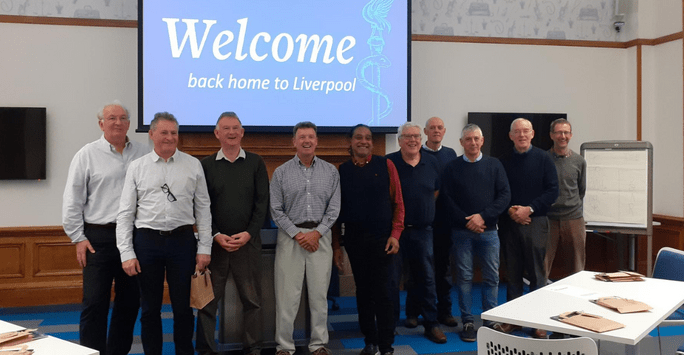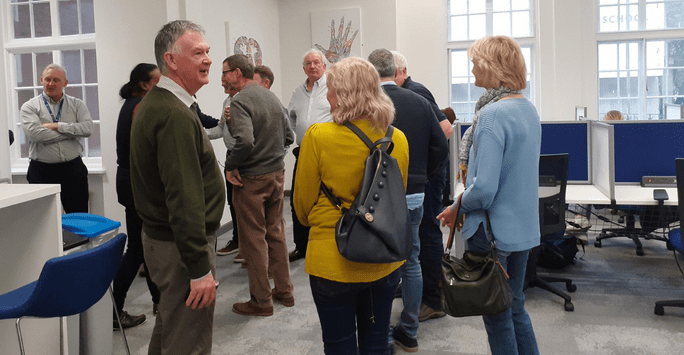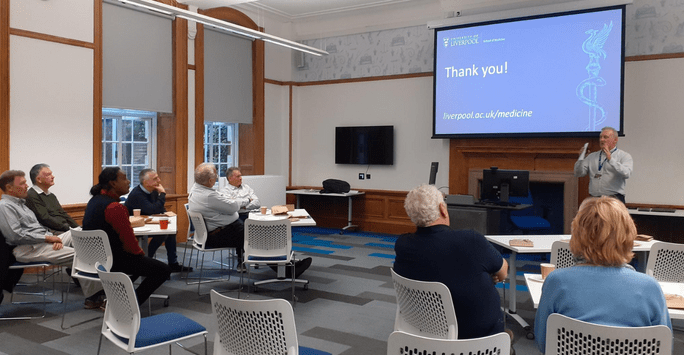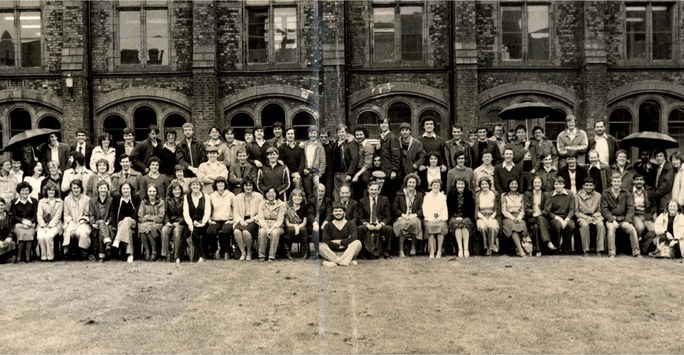
The Class of 1981 came back to their roots this September for a reunion to celebrate (just over!) 40 years since graduation. Reunion organiser John O’Donnell takes the opportunity to reminisce on the University years that were to shape the career ahead of him.
Upon graduating, John O’Donnell, MBChB FRCGP was a pre-registration House Officer at Whiston Hospital, followed by Medical SHO posts in Gateshead and Swansea. He completed Vocational Training for General Practice in Kirkby and at Whiston and became a partner in the same Kirkby Practice in 1986, where he continued until his retirement in 2017.
“I was about 14 when I decided I wanted to be a doctor. Liverpool was my first choice for medical school, well it did offer Liverpool FC, and I arrived in Liverpool in the autumn of 1976. I never regretted my choice.
Liverpool gave me five great years as a student and a career I thoroughly enjoyed, which was spent almost entirely in the Liverpool area.
At the time, Liverpool was a very traditional medical course, with five pre-clinical terms leading up to the second MB exams, followed by just over three years of clinical attachments. The latter were heavily weighted towards the major hospital specialties, with whole terms in medicine, surgery, paediatrics and O&G and, very different to today’s course, just two weeks in General Practice.
 Touring study areas at Cedar House at the September reunion
Touring study areas at Cedar House at the September reunion
At the end, finals were most definitely a marathon, not a sprint. A week of written exams in the Grove Street gymnasium, followed by over two weeks of clinical exams and vivas.
My main memory of finals was the lady at Whiston who was my long case in the Medicine clinical exam. When asked if anything made her symptoms worse, she said no, but (with a knowing grin) they got better when she stopped drinking. She then made doubly sure I saw all her signs of alcoholic liver disease.
The Dean of the School when we started was Cecil Gray, a pioneering anaesthetist, who developed the use of muscle relaxants and introduced the ‘Liverpool technique.’ Anatomy wasn’t one of my strengths and, in common with countless others, I benefited from the teaching of Dr MacMillan, known to all as Daddy Mac.
He was a great teacher with a wonderful ability to get across what you needed to know, and in such a way that you didn’t forget it.
A particular rite of passage was the final year circus presided over by Dr A John Robertson, aka Black Jack. Fortunately, he was absent when it was my turn, and my stumbling presentation of a long case was heard much more sympathetically by one of his colleagues. A few years later, a local GP was being plagued by a patient with minor symptoms who wanted a second opinion. He thought, who do I know who will effectively tell this patient to go away? The letter began, ‘Dear Dr Robertson...’
As a final year student at Broadgreen, I first met Dr Eric Baker-Bates, known to all as BB. His father had been a doctor and mayor of St. Helens 4 times, as well as owning the first motor car in the town. BB was in his mid-70s and long retired, but he couldn’t stay away. He would turn up unannounced at any hospital on Merseyside, locate a group of medical students and whisk them off on a teaching ward round, all done in his own inimitable style. This happened to us, and was EVEN followed up by lunch at his flat on Rodney Street.
 Meeting with Dr Matt James at Cedar House
Meeting with Dr Matt James at Cedar House
Liverpool Medical Students Society (LMSS) was an important part of my time as a student. Meetings were held every Thursday evening during term time in the Old Surgery Lecture Theatre in the Derby Building. It was traditional that the benches below the walkway were for final year students and honorary life members. Afterwards, we’d go to the medics’ pub, the Mount Vernon, sadly no longer standing. Known to everyone as Aggies, after Agnes the landlady, it was used by the Medics football and rugby clubs after home matches on Wednesday afternoons and Saturdays.
Never quite good enough to play, I took up refereeing for the football team and would ref the matches against other medical schools on a Wednesday afternoon.
Tours became an established feature of our season, we’d go to London every autumn, playing against the likes of Charing Cross and St. Mary’s. We also went to Paris, Dublin and twice to the Isle of Man. We were fortunate to have a crop of very good players and so we joined the Shipping League, originally founded for the numerous shipping lines that once operated out of Liverpool.
I qualified in the summer of 1981 and did my pre-registration house officer jobs at Whiston Hospital. We worked a basic 40-hour week, plus on call. The Doctors Res was situated across the car park from the old A&E department. Downstairs was a small kitchen where meals came over in one of those large trolleys that served the wards, but Gladys, Hettie and colleagues would rustle up omelettes or cheese on toast on request. As well as allowing you a quick meal, the dining room provided a forum for discussion and advice with the consultants and other doctors. We all lived in, as did some of the SHOs and Registrars.
From the lounge, the medical students would make the midnight run to the hospital kitchen, to collect bacon or sausage butties for the on-call team.
A well-loved aspect of life at Whiston was the Green Dragon Thursday Club, founded by the late, great, Dr Eric Sherwood-Jones. Again, it gave us somewhere to socialise outside work and to swap anecdotes about hospital life over the preceding week.
 The Class of 1981
The Class of 1981
If I could talk with my 18-year-old self back in 1976, my advice would be to make the most of your time at medical school, because those five years pass very quickly.
My advice to new doctors would be - be kind to yourself.
We all make mistakes, we’re only human, but that doesn’t make you a bad doctor or a bad person. Talk to each other, construct a support network and look out for each other.
Being a GP was a very rewarding career - you need to be an expert generalist, be comfortable living with uncertainty, whilst creating an effective safety net for those patients whose problem might evolve into something more serious.
If you are interested in the wider determinants of health, you will find much to engage your interest in General Practice. You will be rewarded by building long term relationships with patients and getting to know whole families. More than once, I gained a much deeper insight into a patient’s problems when I found out who their parents were.
Health is more than just the absence of disease.
Many people have unhappy, difficult lives, which manifest as symptoms. The GP recognises this and can help, sometimes just by talking.
The Class of 1981 have held a reunion every five years since qualification. The five years we spent together as medical students were probably the most formative, in terms of our future professional and personal lives. We’ll always have that in common.”
For their reunion celebrations this year, postponed from last year, the Class of 1981 enjoyed a campus tour, with stop offs at the Waterhouse Building (‘The Old Royal’), the old surgery lecture theatre, now part of the Victoria Building, and a talk and light lunch with Supra Theme Lead Patient in Community Care Dr Matt James at Cedar House. All followed up by dinner at The Royal Liver Building.
If you are a Liverpool graduate and interested in organising a reunion to catch up with your classmates, the Alumni Team are here to help. Reach out to them at alumni@liverpool.ac.uk.